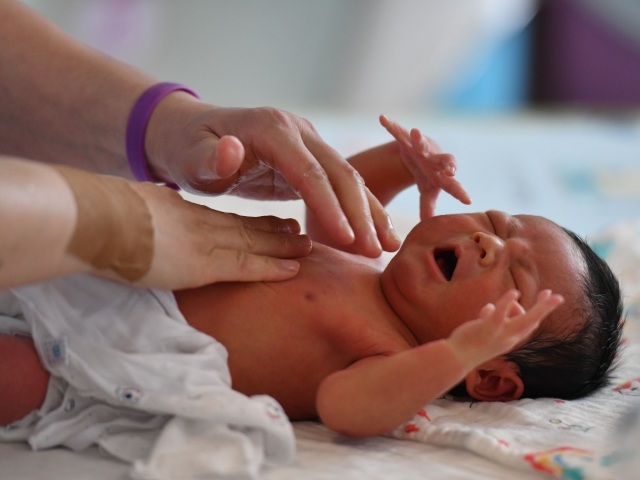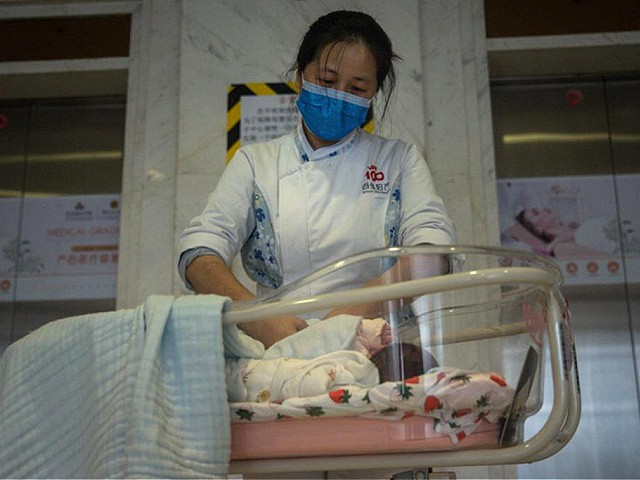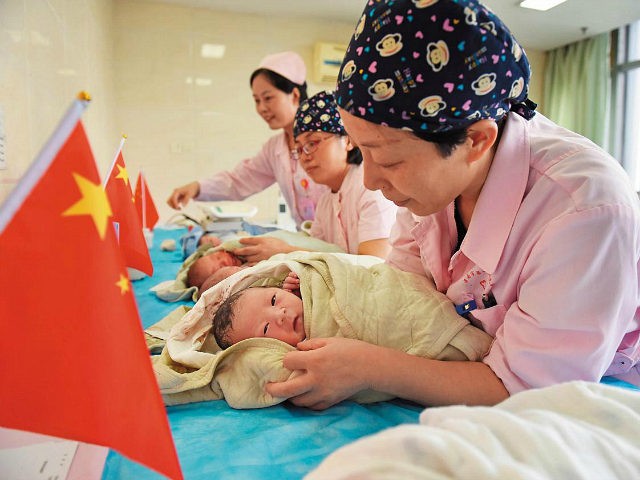The Chinese city of Xian on Tuesday observed the holiday of Qixi – essentially China’s Valentine’s Day – by peppering residents with text messages urging them to have more children to reverse the population crash initiated by the Communist Party’s brutal One Child Policy.
According to local media reports, the text messages from Xian’s Health Commission and Family Planning Association wished residents “sweet love, marriage, and childbirth” for Qixi and told them to create “good fertility” for the benefit of the nation.
The “sweet love” text messages were backed up by a post on Weibo, China’s tightly controlled version of Twitter, that ordered residents to “continue the blood of China and share the important task of rejuvenation” if they are at the “right age” for childbearing. This sounded more quintessentially Communist than wishing sweet love on people, especially since the Weibo post did not bother to specify what the “right age” for childbearing is.
Qixi is also known as Double Seventh Festival, because it falls on the seventh day of the seventh month of the lunar calendar, which works out to August 22 this year.

File/A nurse massages a newborn baby in a maternity hospital in Fuyang in central China’s Anhui province Monday, Aug. 08, 2022. As the birth rates keeps dropping in China, the country is expected to encounter negative population growth soon. (AN MING/ Feature China/Future Publishing via Getty)
The 2,000-year-old festival is based on a legend about a demigoddess falling in love with a mortal man, and her angry celestial parents squirting the Milky Way across the sky to keep them apart, only to be thwarted by helpful magpies who made a bridge across the raging river of stars so they could be together. The magpies’ selfless and romantic effort moved the gods to allow the lovers to meet once a year, on the seventh day of the seventh month.
The Qixi holiday is considered rather quaint in modern China, but the government is desperate to reverse its population crisis, so any opportunity to remind people to have babies will be taken.
The Chinese government officially admitted to its first net population decline at the beginning of 2023, although it refuses to admit the decades of One Child Policy forced abortions played a role in today’s empty nurseries.
Last week, the China Population and Development Research Center reported a far lower nationwide fertility rate than expected, giving China one of the lowest fertility rates in any developed nation.
The Chinese government has implemented a series of strategies to reverse population decline but, as last week’s surprising fertility report demonstrated, none of them have worked very well. The latest brainstorm is to attempt to remove the cultural stigma surrounding unwed motherhood, and perhaps even giving single women access to in vitro fertilization (IVF). China is dramatically increasing its number of IVF clinics to meet anticipated demand for the procedure.
In April, the southwestern city of Chengdu pioneered the legal registration of children by unmarried women, which makes them eligible for benefits such as paid maternity leave and childcare subsidies.
China is facing the same basic issue as most advanced nations, namely a rising standard of living that makes ambitious young people reluctant to take on the expensive burden of child-rearing, but this is exacerbated by unique factors like the One Child hangover and some characteristics China shares with Asian nations like South Korea and Japan.

File/A maternity nurse wears a mask as she cares for a newborn at a private maternity hospital on March 12, 2020 in Wuhan, Hubei, China. (Photo by Getty Images)
The Financial Times (FT) noted on Monday that all three Asian countries have hyper-competitive education and employment systems that a growing number of young people are simply dropping out of. In each case, a bump of despair prompted by rising unemployment led a sizable number of young people to conclude that family life was completely unaffordable, which led to demographic decline.
China evidently listened to demographers who said one of the big problems with population decline is the “spillover” effect of rising wealth. Rich families spend more on their children, which drives up the cost of child-rearing for everyone, pricing less affluent couples out of the baby market.
FT noted that Chinese dictator Xi Jinping tried to address this problem by outlawing private tutoring because wealthy families were spending a great deal of money on such services to give their children a competitive edge. This ham-fisted solution only succeeded in wiping out the private tutor industry, which was a major source of jobs for young university graduates.
South Korea and Japan can at least have frank discussions about their demographic crises, but FT pointed out that China’s “paranoid one-party system does not have that flexibility,” so China’s population decline is likely to become a source of political unrest as well as economic crisis.
“Xi’s encouragement of a cult of personality – and his triumphalist rhetoric about the “great rejuvenation of the Chinese people” – will make open public debate about the country’s complex social and economic challenges all but impossible,” FT predicted. Instead of open debate, the people are getting text messages from city officials telling them to get pregnant on Chinese Valentine’s Day.

COMMENTS
Please let us know if you're having issues with commenting.